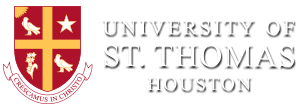Be Bold Blog
The University of St. Thomas (UST) is Houston’s Catholic University, committed to the Catholic intellectual tradition and the dialogue between faith and reason. Our blog is dedicated to helping you explore your future career possibilities and how to make the most of your college experience.
Value of a Liberal Arts Education
Appreciating the True Value of a Liberal Arts Education
There are numerous decisions you have to make en route to choosing a college. Everything from the typical class size to the institutional scholarship options can impact your decision. And if you’re anything like the students who’ve come before you, you’re likely weighing whether a liberal arts education is right for you.
Maybe friends or family have told you choosing a linear path that prepares you for a specific career is the way to go. That’s a common mindset among higher education students. Driven in part by a desire to secure a job that pays well, students are turning toward career-oriented programs that focus mostly on one discipline.
But you’re not solely motivated by salary. Perhaps your larger goal is to become an ethical leader or build relationships in your community. For students like you, the value of a liberal arts education is especially high. Before digging into why that is, it’s important to first look a little closer at this multidisciplinary education model.

What is a liberal arts education, anyway?
Most people assume that liberal arts students are only those who choose a humanities or fine arts major — English, philosophy, creative writing, theatre — but that’s not actually true. You can gain a liberal arts education while pursuing any major that interests you. Lee Holm, director of academic advising and enrollment services at the University of St. Thomas (UST), explains this path is more indicative of the institution and overarching educational philosophy.
“It means you have a broad-based education in more areas than just your specific major,” he points out.
The goal of a liberal arts education is to provide students with a balanced education. UST, for instance, is notorious for creating a dialogue between faith and reason. That’s evident in the core curriculum, which includes courses in theology, philosophy, math, fine arts and several other disciplines.
“Independent universities, such as ourselves, have nuances to their core,” Holm elaborates. “Our core includes theology and philosophy courses that you wouldn’t have at a state school.”
5 Facts that demonstrate the value of a liberal arts education
Now that you have a better sense of what it means to obtain a liberal arts education, you may want to know how this type of college path can help you achieve your personal and professional goals. There are a number of notable reasons to consider pursuing a liberal arts path.
1. Employers are eager to hire liberal arts grads
The Association of American Colleges and Universities (AAC&U) has been digging into the way liberal arts education benefits students, employers and the nation as a whole since 2005. One of the organization’s surveys reports that 80 percent of employers think all students should study the liberal arts. This is mostly due to the versatile skills students develop by pursuing this educational path.
While every career requires different technical competencies, there are a number of overarching soft skills that employers in nearly every professional field value. A separate AAC&U report took a closer look at which skills are most in-demand among business executives and hiring managers. Survey participants agreed that oral communication, critical thinking, ethical judgement and teamwork skills are the most important competencies they consider when hiring recent college graduates. Holm elaborates on this using lawyers as an example.
“Really, their ability to read, write and use logic and determination — that liberal arts broad base — is what prepares them to be a lawyer,” he offers.
Holm adds that employers are often seeking candidates who are able to take innovative approaches to solving problems as opposed to following a specific protocol each time. They want employees who can think outside the box.
“The liberal arts education teaches them that maybe you just need a bigger box or to not be in the box,” Holm explains. “Maybe the box doesn’t even exist. Maybe it’s a sphere or something else.” This alternative way of thinking is something liberal arts students are well-prepared for.
2. Liberal arts grads are just as successful as any other college graduate
It’s a common misconception that liberal arts graduates are directionless and won’t achieve as much as those who choose a more career-focused educational path. Liberal arts students, critics say, aren’t being trained to do anything specific.
“It’s not that you don’t have any direction,” Holm counters. “It’s that you recognize you’re not done being educated yet.”
There’s real evidence to support the idea that liberal arts grads stand to be successful. One workforce survey reveals humanities graduates are just as satisfied with their work as their peers who pursued other fields of study. Salaries are also comparable. A recent analysis shows that when you control for choice of major and occupation as well as school selectivity, there’s no substantial difference in earnings from liberal arts graduates and those who obtained their degree from another type of institution.
3. A liberal arts education prepares you for a career rather than a singular job
As you continue to grow as a professional, you’re going to want to seek rewarding opportunities that present themselves along the way. There’s even a good chance you’ll transition to an entirely different career at some point.
“You’re not going to go back to school every time that happens,” Holm points out. “If you went to a school that was really dedicated to teaching the liberal arts, you’re probably going to come out a much better thinker, reader and writer.”
He’s on to something. A recent report finds that liberal arts graduates are often able to leverage their skills to transition to in-demand careers. On top of that, a liberal arts curriculum sets students up for long-term success since the more human competencies they develop aren’t as easily replaced by automation the way some of the more technical skills are.
“A robot isn’t always going to know the best solution in real life,” Holm explains. “It just knows the best solution from an order of operations function. Somebody still has to tell it what’s really important.” He adds that many advances might even help smart individuals do their jobs better and more efficiently rather than replace them.
4. You could make a large and lasting impact
Schools like UST also recognize that they’re educating students to not only help them achieve their career goals, but to improve our world. Today’s students will one day serve on boards of directors for organizations, participate in community events and much more.
“What we’re hoping for as a society is that we have intelligent people who are willing to give back to their community,” Holm says.
5. You could enjoy a greater quality of life by studying the liberal arts
Taking courses outside of your intended career track allows you to explore other interests — even ones you don’t yet realize you have. Perhaps an elective course in history ends up inspiring you to pursue a minor. Being introduced to different disciplines can also help develop an appreciation for the arts, sports and even humor.
“The knowledge you have can help you understand the subtext of jokes that goes beyond a surface level,” Holm elaborates. “There’s actual entertainment, quality of life that comes from being an educated person.”
When you consider all that goes into a liberal arts education, it might seem overwhelming to select a major. Your best bet is to find what you’re most passionate about. Once you find it and obtain a degree in that concentration, your career options will actually multiply.
“Don’t think of it as narrowing the funnel,” Holm advises. “Think of it as allowing you to finally get out of the funnel and now move in different directions.”
Where will a liberal arts education take you?
By now, you probably recognize the value of a liberal arts education is greater than what you may have realized. Whether you’re studying computer science, communications or another subject, you stand to benefit from learning about a wide range of disciplines.
Maybe you feel drawn toward this holistic approach to college. You don’t even have to know what you want to study yet. A quality liberal arts school like the University of St. Thomas can provide guidance to help you discover the right path for you. That said, it’s a good idea to start thinking about which subjects interest you. Learn more about your options by visiting our Academic programs page.
Ready to take the next step?
Related articles
About UST
The University of St. Thomas (UST) is Houston’s Catholic University, committed to the religious, ethical and intellectual traditions of Catholic higher education. For more than 70 years, we’ve been graduating students like you into successful careers in medicine, education, business, public administration and more – throughout Houston and across the globe.

